The Boulevard of Broken Dreams
The Boulevard of Broken Dreams
"Boulevard of Broken Dreams" is a 1933 hit song by Al Dubin (lyrics) and Harry Warren (music), set in Paris. The song appeared in the 1934 film “Moulin Rouge” and was sung in the film by Constance Bennett. However, Bennett never made a recording of the song. It was originally recorded by Deane Janis with Hal Kemp's Orchestra on October 31, 1933, in Chicago before the release of the film and was issued on the Brunswick label. Although numerous artists have recorded “Boulevard of Broken Dreams” (including Bing Crosby 1944), this song is very strongly identified with Tony Bennett. In fact, his demo record of “Boulevard of Broken Dreams” was heard by Mitch Miller (head of A&R ) and got Bennett his first recording contract with Columbia Records.
The Boulevard of Broken Dreams
The song's melancholic, haunting melody, composed by the underrated Harry Warren, who is credited with more hit songs for movies than the prolific Irving Berlin, has attracted as much attention from instrumentalists as vocalists.
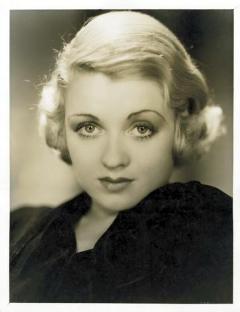
Constance Bennett
Harry Warren (December 24, 1893 – September 22, 1981) was the first major American songwriter to write primarily for film. He was nominated for the Academy Award for Best Song eleven times and won three Oscars for composing “Lullaby of Broadway”, “You’ll Never Know” and “On the Atchison, Topeka and the Santa Fe”. He wrote the music for the first blockbuster film musical, “42nd Street”, choreographed by Busby Berkeley, with whom he would collaborate on many musical films.
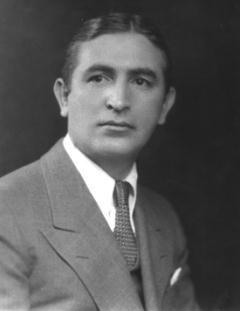
Harry Warren
Warren was born Salvatore Antonio Guaragna, one of eleven children of Italian immigrants Antonio (a bootmaker) and Rachel De Luca Guaragna, and grew up in Brooklyn, New York. His father changed the family name to Warren when Harry was a child. Warren had an early interest in music and taught himself to play his father's accordion. He began to play the drums professionally by age 14 and dropped out of high school at 16 to play with his godfather’s band in a traveling carnival. Soon he taught himself to play piano and by 1915, he was working at the Vitagraph Motion Picture Studios, where he did a variety of administrative jobs, such as props man, and also played mood music on the piano for the actors, acted in bit parts and eventually was an assistant director. He also played the piano in cafés and silent-movie houses. In 1918 he joined the U.S. Navy, where he began writing songs.
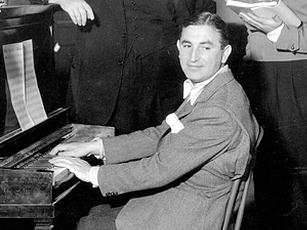
Harry Warren
Warren wrote over 800 songs between 1918 and 1981, publishing over 500 of them. They were written mainly for 56 feature films or were used in other films that used Warren’s newly written or existing songs. His songs eventually appeared in over 300 films and 112 of Warner Brothers “Looney Tunes” cartoons.
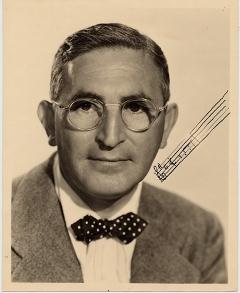
Harry Warren
He started working for Warner Brothers in 1932, paired with Dubin to write the score for the “42nd Street,” and continued to work there for six years, writing the scores for 32 more musicals.
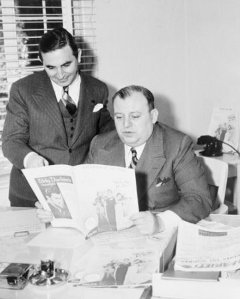
Harry Warren & Al Dubin
Alexander “Al” Dubin (June 10, 1891 - February 11, 1945) came from a Russian Jewish family which immigrated to the USA from Switzerland when he was two years old. He grew up in Philadelphia. There he worked as a songwriter and lyricist for various Tin Pan Alley music companies. He served in the First World War.
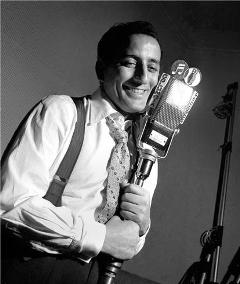
Tonny Bennett, 1950
Dubin was responsible for lyrics to several Broadway shows. In 1970 he was inducted into the Songwriters Hall of Fame. He is perhaps most famous for the film “42nd Street”. Other famous movies included “Footlight Parade” and all five “Gold Diggers” films. Together, Warren and Dubin wrote 60 hit songs for Warner Brothers. In 1980 producer David Merrickand director Gower Champion adapted “42nd Street” into a Broadway musical that won The Tony Award for Best Musical for 1981.
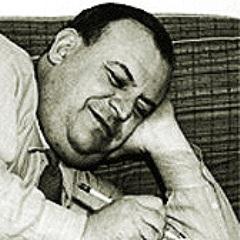
Al Dubin
“Moulin Rouge” is a 1934 film starring actress Constance Bennett. It contained the songs "Coffee in the Morning" and "Kisses in the Night" and "Boulevard of Broken Dreams" with music by Harry Warren and lyrics by Al Dubin. It has no relation to the 1952 film with the same name. The film was Twentieth Century's fourth most popular movie of the year.
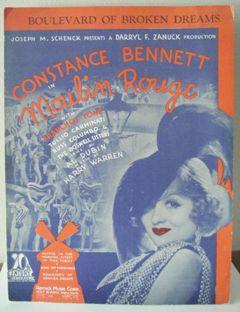
Moulin Rouge, poster 1934
The song was one of the first records for Tony Bennett in 1950; Bennett made a more Latin sounding recording of the song in 1952 and it was a hit. He recorded it again in 1990 and 2007. Bennett recorded a duet of the song with Sting for his 2006 “Duets: An American Classic album.”
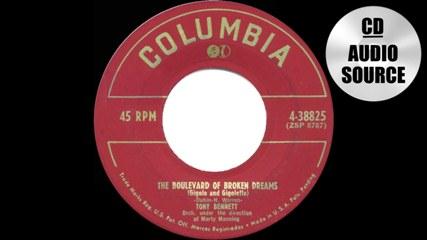
Tony Bennett, first single 1950
The Boulevard of Broken Dreams, lyrics
I walk along the street of sorrow, The boulevard of broken dreams. Where gigolo and gigolette Can take a kiss without regret So they forget their broken dreams. You laugh tonight and cry tomorrow, When you behold your shattered schemes. And gigolo and gigolette Awake to find their eyes are wet With tears that tell of broken dreams. Here is where you’ll always find me, Always walking up and down. But I left my soul behind me In an old cathedral town. The joy you find here, you borrow, You cannot keep it long, it seems. But gigolo and gigolette Still sing a song and dance along The boulevard of broken dreams. Here is where you’ll always find me, Always walking up and down. But I left my soul behind me In an old cathedral town. The joy you find here, you borrow, You cannot keep it long, it seems. But gigolo and gigolette Still sing a song and dance along The boulevard of broken dreams.
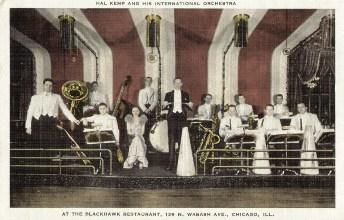
Hal Kemp's Orchestra with Deane Janis








